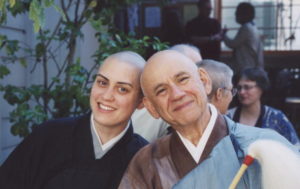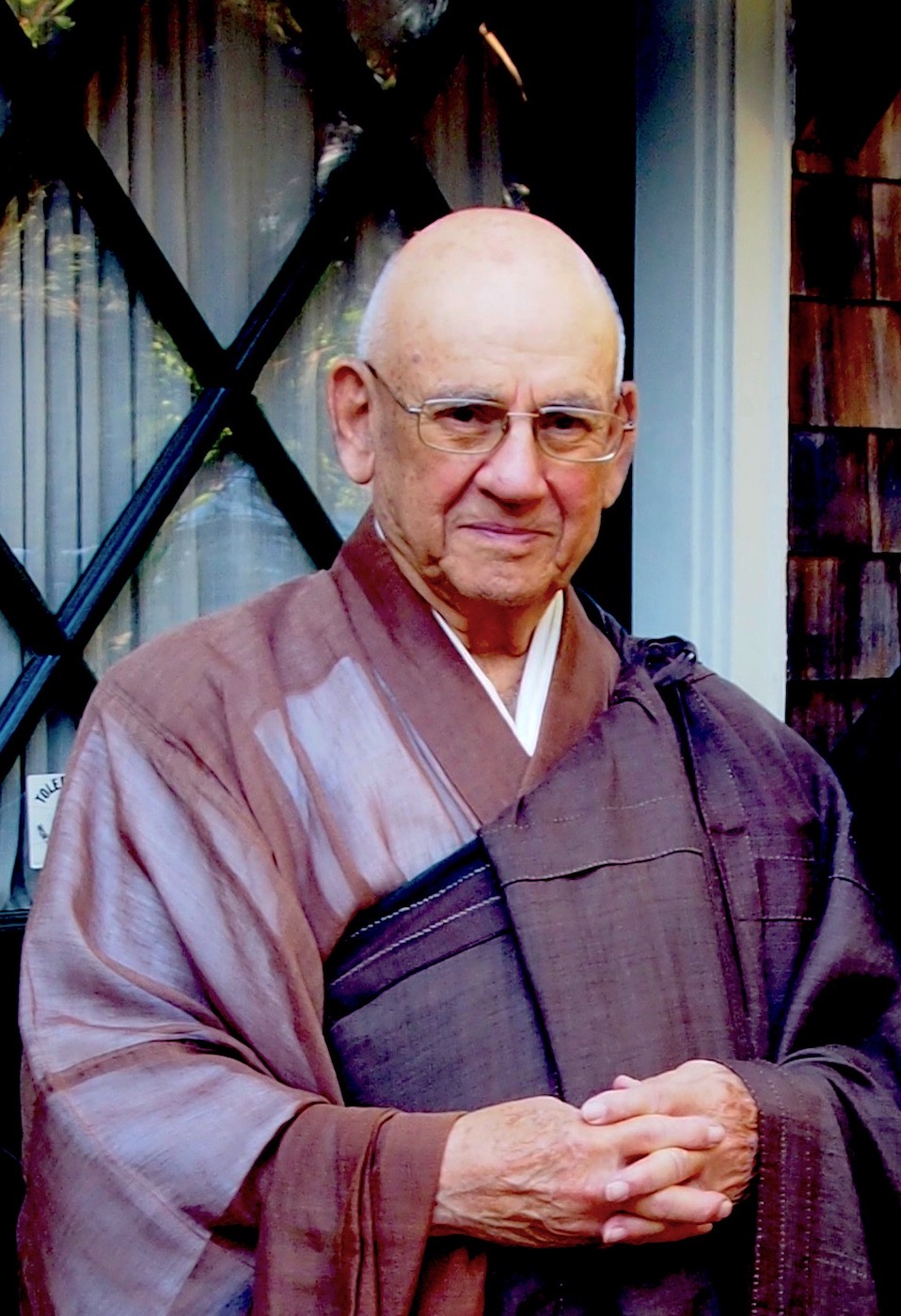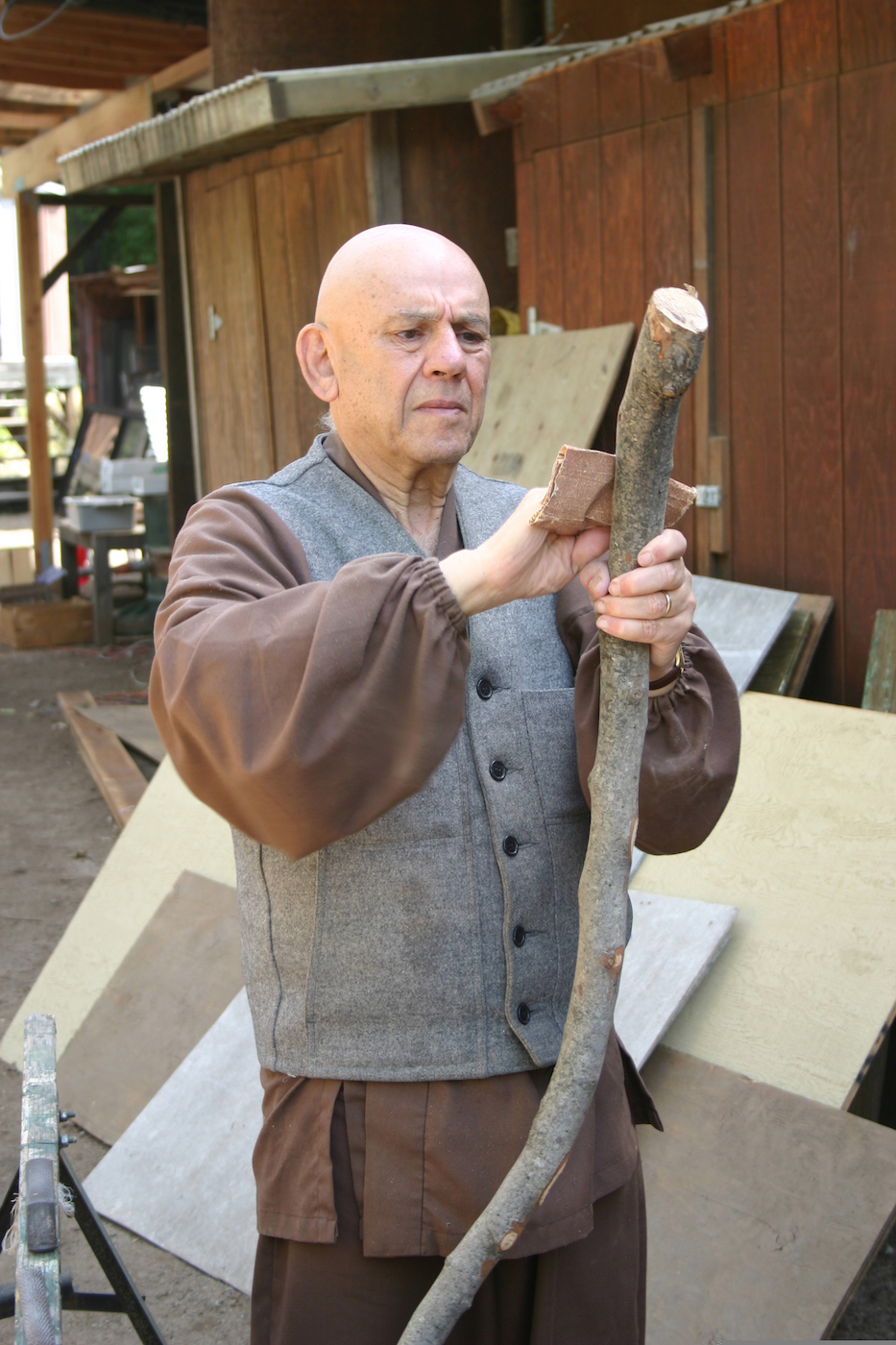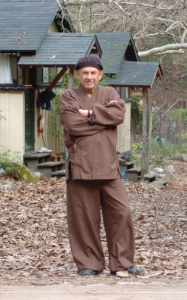Hakuryū Sōjun Mel Weitsman
July 20, 1929 – January 7, 2021
“We humbly pray that within the current of birth and death he shall be as the lustrous pearl shimmering undisturbed in the vast sea; that on the shore of nirvana he/she shall be as a cinnamon moon shining alone in the azure sky; so that he will guide the entire world, together climbing the path to awakening.” – Soto School Scriptures for Daily Services and Practice, p. 68- 69
Hozan Alan Senauke, Acting Head Priest at BZC, shares an obituary and remembrance of Sojun Mel Weitsman:
With great sadness the sangha of Berkeley Zen Center announces that Hakuryu Sojun—White Dragon/Essence of Purity—Mel Weitsman peacefully passed from this world to the Pure Land of Buddhas and Ancestors at home, at 5:30pm on Thursday, January 7. He was 91 years old.
Sojun’s understated but clear leadership made BZC a steady beacon for Buddhist practitioners and other spiritual seekers in the East Bay. With a widening circle of dedicated Zen students, as guiding teacher and abbot at BZC for fifty-three years, Sojun created a place where there could be rigorous daily sitting practice integrated with people’s life of family, work, and service. He often spoke of BZC as a kind of “one room schoolhouse,” where each person could find the necessary teachings for their position in life. Anyone could knock on his office door and Sojun would invite them in.
Born in Los Angeles in 1929, Sojun Roshi’s broad life experience included years of art study and abstract expressionist painting, work as a house and boat painter, cab driver, and music instructor. But his life work was to embrace and sustain the practice of zazen passed from his teacher Shunryu Suzuki Roshi.
With Suzuki Roshi, Sojun founded Berkeley Zen Center in 1967. In 1984, Sojun received dharma transmission from Suzuki Roshi’s son, Hoitsu Suzuki Roshi, abbot of Rinso-In Temple in Japan, and was installed as BZC’s first abbot in 1985. In declining health, he stepped down as abbot in October 2020, assuming the position of Founding Dharma Teacher.
From 1988 to 1997, Sojun served as co-abbot of San Francisco Center, where he had begun his Zen practice in 1964. He continued as Senior Dharma Teacher at SFZC until his death. He was also one of the founding teachers of the Soto Zen Buddhist Association and the American Zen Teacher’s Association.
Sojun Roshi was deeply respected in the Zen community—in the U.S. and in Japan. His own warm embodiment of Suzuki Roshi’s “ordinary mind” was a path of steady and determined practice, the luminous quality of “nothing special.” Although Sojun had more than thirty transmitted dharma heirs leading Zen centers around the U.S., he was most at home in the lay-Zen community of Berkeley Zen Center, which continues to thrive.
Sojun Roshi is survived by his wife Liz Horowitz Weitsman, their son Daniel, and uncountable disciples and students across the United States and around the world. Cards and letters can be sent to Liz, Daniel, and the BZC sangha c/o Berkeley Zen Center, 1931 Russell Street, Berkeley, CA 94703.
— Hozan Alan Senauke, Acting Head Priest, BZC
The bulk of Sojun’s audio lectures are found at https://berkeleyzencenter.org/talks-2/. Sojun Roshi’s forthcoming memoir and collection of lectures will be published by Counterpoint Press in 2021, as will a new collection of Suzuki Roshi lectures, edited by Sojun and Jiryu Rutschman-Byler.
Hozan also shared: A few of us sat with Sojun’s body this evening. We are grateful to have had a visit from Akiba Sokan to say goodbye to his friend. Announcements forthcoming about other ceremonies and gatherings. – Love, Hozan
Read the Lion’s Roar article posted on January 8th.
A few other Resources:
- Hear David Chadwick and Sojun Mel’s recent (11/15/20) conversation.
- Mel on Cuke.com.
- Watch Sojun Mel give Zazen Instruction.
- Watch Mel speak about Work-Practice (at Tassajara).

Thank you
by Mel’s Wife, Liz Horowitz
Thank you from the bottom of my heart for the support many of you have given Mel and me, especially during the last month of Mel’s life, including visits so I could go out for a couple hours and not leave Mel alone; food for us when caring for Mel took up most of my time; and the time and energy a few of you, especially Andrea Thach, spent talking with me and sharing your warm hearted wisdom. And for the last two weeks of Mel’s life, we had the wonderful support and assistance of Mel’s cousins, Dave and Linda Young, who traveled from Oregon to assist me in caring for Mel. My gratitude to them is immeasurable.
And thank you to all of you who wrote cards and emails expressing your support for me and your love and gratitude to Mel. After Mel stopped reading them himself, I read them all aloud to him. I cannot express how meaningful those words were for me, and I know they were for Mel too. Thank you!
Alan asked me to post the following note, which I originally wrote to friends outside the Zen community:
I am sad to report that Mel died, peacefully at home, at about 5:30 pm, January 7. He had a good quality of life well beyond his expected lifespan after being diagnosed with bile duct cancer in September 2019. Matter of fact, after he got a stent placed to open up his blocked bile duct, he felt just fine for about a year, and for a long time his terminal diagnosis seemed quite unreal. Only in the past few months did he start having symptoms. Up until then he had continued with all his usual activities, without even suffering the dreaded chemo side effects. (After managing Mel’s treatment for a year, his oncologist said Mel’s underlying health was like a healthy 70 year old, not a 91 year old with terminal cancer.)
Mel had a good life. After a stint in the Marines, he studied at the San Francisco Art Institute under the abstract expressionist Clyfford Still. Just when Mel’s work was beginning to gain recognition, he quit painting in order to devote himself to studying Zen Buddhism with Shunryu Suzuki Roshi in San Francisco. Mel was also an accomplished recorder player, and taught recorder and played with various amateur chamber groups.
But Mel’s true life’s work was founding (with Suzuki Roshi’s guidance) the Berkeley Zen Center in 1967 and nurturing it to become the thriving practice center and community it now is. For the past few weeks I’ve been reading to Mel the cards, letters, and emails his students and disciples have sent him, and we have both been overwhelmed by the outpouring of love and gratitude Mel has received. Here are passages from two cards that express why a couple of people are so grateful to him:
“You taught me to treasure the day-to-day, the ordinary. I learned that when I slow down and focus on the moment in front of me, I realize what a miracle this moment is…. You taught me to see the beauty of the weeds in my garden… the beauty of imperfections.”
“My father died recently, and I can’t imagine going through the tumult and heartbreak of that without the ground of [Zen] practice beneath my feet. You helped nourish that ground and prepare me to stand on it, so thank you, deep thank you.”
I’ve had struggles and arguments with Zen practice myself, and decades ago I dropped out of formal practice for the most part. But I have always appreciated Zen practice, and Mel’s down to earth, unpretentious way of communicating its essence to people who come seeking a more satisfactory way to live their lives. I will miss him very much.
Liz
 Last Week in Samsara
Last Week in Samsara
My dear teacher Hakuryu Sojun—White Dragon/Essence of Purity—Mel Weitsman peacefully passed from this world to the Pure Land of Buddhas and Ancestors on Thursday, 7 January 2021. He was 91 years old.
As guiding teacher and abbot at Berkeley Zen Center (BZC) for 53 years, with a strong circle of dedicated Zen students, Sojun Roshi created a place where vigorous daily sitting practice was integral with people’s life of family, work, and service. He often spoke of BZC as a kind of “one room schoolhouse,” where each person could find the necessary teachings for their position in life.
I want to speak more personally about Sojun.* I also recognize that his death came just a day after the unprecedented insurrection and attack on the Congress in Washington, DC. Events that cannot be ignored. What can I say about the contrast and lessons of these losses?

Hakuryu Sojun Mel Weitsman. Image courtesy of the author
I was watching the Senate counting electoral ballots and debating spurious objections to certifying the November election of Biden and Harris when, at around 2:30pm Eastern time, armed rioters breached security lines and broke into the US Capitol. President Donald Trump encouraged outright insurrection by his supporters, strategically massed in Washington, DC. He told them to “fight like hell” in his attempt to overturn election defeat by Joe Biden. Even after the US Capitol was attacked, while Republican congresspeople and members of the Trump administration begged him to call off his supporters, the best Trump could do was to tell the rioters, “I know your pain. I know your hurt. But you have to go home now.” He went on to call the rioters “very special.” Meanwhile accounts on television, radio, and newspapers reported fatalities among the rioters and DC police, with numerous weapons confiscated and an explosive device found on the Capitol grounds.
Despite some bitterly contested elections, for 224 years, since the transition from the first president George Washington to the second president John Adams, the United States has always witnessed a peaceful transition of government. No longer. However, a “peaceful” transition does not necessarily imply a just or nonviolent transition. From the nation’s beginning, the “power” of our government has grown from the soil of white supremacy, racism, and other forms of domination at home and abroad.
“Power” has supported this madness up to the present day, while consistently perpetrating and excusing the assassination of Black youth, and the violent suppression of peaceful protest. Imagine the response, the bloodbath, if these insurrectionists happened to be Black or other people of color. And where were the police in the early hours of insurrection on 6 January? Certainly, we all had months of forewarning about Trump and his follower’s intentions.
Many of us have been saying for four years that Donald Trump does not just remind us of fascism. He embodies it. He has consistently fomented the worst aspects of white communalism and violence. As we witnessed attacks on the US Capitol, former California Governor Arnold Schwarzenegger invoked Kristallnacht, the 1938 Nazi attack against Jewish homes, businesses, and synagogues in Germany and Austria. But this time the target was the very center of our US government.
On 6 January we saw rioters in ersatz military uniforms, dressed as pioneers and Vikings, wearing body paint and Trump gear. This is the primitive community that Trump has carefully created, nurtured, and turned loose in his term of office.

Hakuryu Sojun Mel Weitsman. Image courtesy of the author
You may ask, what has this to do with Buddhism? A fair question. So I return to the teachings of my late teacher Sojun Mel Weitsman. I have lived at the Berkeley Zen Center for 36 years, 33 of them as a Zen priest. My contact with Sojun was open and constant, almost daily when we were both here in Berkeley, brooking no formality, but mutually respectful and formal when appropriate. This continued until his very last days. All of Sojun’s students knew that we could knock on his office door at any time and he would invite us in.
Sojun Roshi’s character and teachings stand in sharp contrast to Donald Trump. He was ordinary, with no hint of self-promotion, narcissism, or aggrandizement. This kind of ordinariness is a remarkable quality. Sojun was honest about what he thought, but never stuck on his view, except perhaps regarding the primacy of zazen as a practice for the healing of life and world, as it had healed his life. One could disagree with him and he might even change his mind.
Most importantly, Sojun believed in harmony in the community, and ceaselessly encouraged us to live and practice that way. We cherish the Three Refuges—Buddha, Dharma, and Sangha. In the way Sojun lived, it was clear that the Buddha and the Dharma and zazen itself were in the service of the Sangha.
Community itself is mysterious and not always easy. I have been seeking it all my life and living it in this Zen community for many years. We live and practice closely with each other. Our virtues and flaws are visible to all. At the heart of Sojun’s teaching is the instruction to accept and enjoy our life. In a larger sense, there is no such thing as “my” life. Life includes all people, all beings. So, accepting life implies including and accepting all beings, with their own strengths and weaknesses. Sojun just lived that way, not instructing us with words or plans, but at peace with himself, including even his shortcomings. Showing us a way to live day by day. For me this is Sojun Roshi’s deepest teaching.
In community, fundamentally we love each other even when we might not like each other. This is the spirit that is tragically missing in Trumpian America. Now the Trump regime is coming to an end. At least we hope it is. But the divisions he promoted and confirmed remain as gaping wounds in our society. I think about Dr. Martin Luther King Jr.’s last book. The title itself is a teaching—Where Do We Go from Here: Chaos or Community? I am so grateful for the refuge of our practice and for Sojun Roshi, who will always guide my footsteps toward community, away from the chaos others might foment, as they make their way in greed, hate, and delusion.
Hozan Alan Senauke
Berkeley, California![]()
11 January 2021
* For further biographical details about Sojun Roshi see this obituary at Lion’s Roar, which also includes a wonderful recent video of Sojun reflecting on his teacher Suzuki Roshi, and also from Buddhistdoor Global.
See more:
Austin Zen Center held a brief memorial chant of the Dai Hi Shin Dharani on Saturday, January 9th immediately following zazen, at 9:50am.

